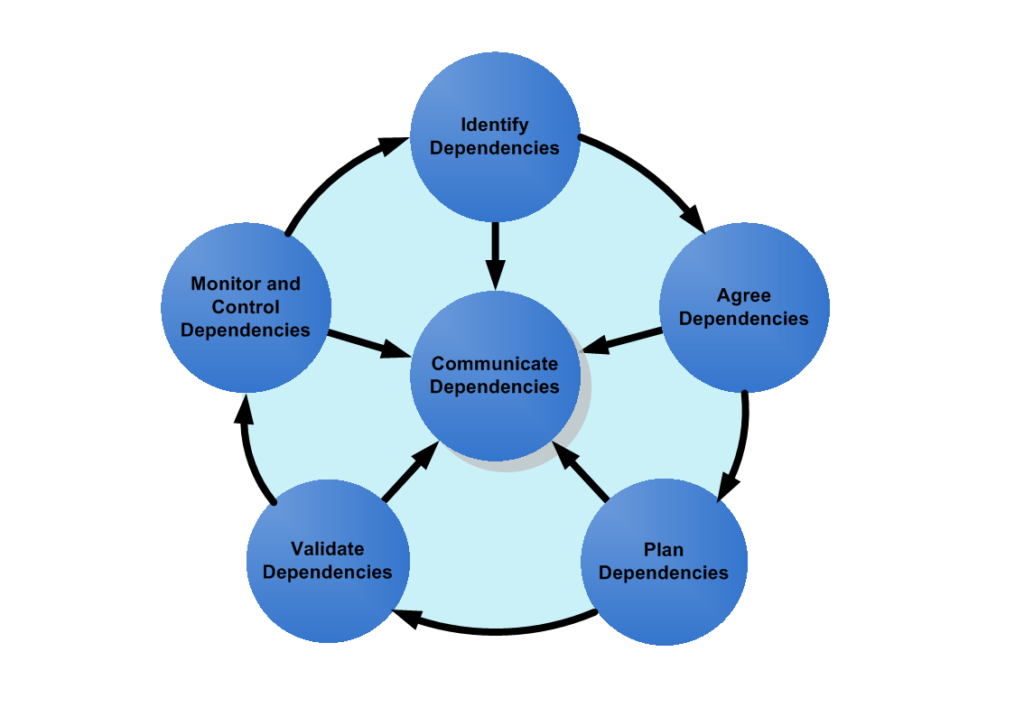How to Manage Project Dependencies
Projects have a poor track record for delivering on time and on budget. Learn how to beat the odds and deliver excellent results, time after time.
by Bryan Barrow
The average project takes around a third longer than planned and costs around twice as much as planned. Around one project in six comes in at twice the planned cost and just under one project in five is cancelled before completion. One key reason for this level of failure is poor dependency management.
A dependency is a relationship between activities or tasks, where the latter task cannot be completed without something from the former. There are several things that you can be dependent on in projects, from including people, assets and equipment, funding, and support.
Dependency Management is the process of managing project dependencies so that you coordinate related project activities, optimise your project schedule, and avoid unnecessary delays. The dependency management process starts with an assessment of your project, its aims, and objectives, then moves onto a review of potential dependencies. Next comes action: to validate, plan and manage your dependencies.
Although the process starts with identifying dependencies, this is not a linear, ‘start at the beginning and work through to the end’ process. Communication is at the heart of the dependency management process. As you discover information, you communicate. When you add dependencies to your plan, you communicate. When you discover something is not on track, you communicate. You will move between one dependency management activity and another, communicating as you go. depending on what you need to do next, so you may spend some time validating dependencies, then go on to identify new ones because of your validation activities.

The Dependency Management Process for Projects and Programmes
Here’s how to manage project dependencies so that you avoid the problems that most projects face and instead go on to achieve your goals and benefits that you set out to:
- Start off by identifying potential dependencies. Read your project’s mandate and business case, all supporting documents and background information. Review any lessons learned from similar projects. Talk to your Sponsors and stakeholders to clarify their needs, expectations, and concerns.
- Prioritise your list of potential dependencies. Meet with those responsible for these dependencies and agree which ones are significant. You will need to add these to your plans.
- Create a plan to manage your dependencies. Produce your project schedule. using information from your planning workshop, product backlog or other planning approach, as appropriate. Add in details of your dependencies (both inbound and outbound) and identify target dates for their delivery. Make a note of any dates that do fit with your desired timeline.
- Validate your dependencies with those responsible for them. Meet with your colleagues, partners, collaborators, and vendors to discuss and agree dates for delivery of any dependencies. Adjust your plans as you discuss alternative delivery dates with them. Baseline your project schedule once you have completed your review and publish to all parties.
- Put your project plan into action. Monitor progress of all dependencies, both inbound and outbound, until the dependencies have been satisfied. Continue to work with your collaborators and adjust your plans if necessary, so that you stay aligned.
- Publish regular updates to your stakeholders. Keep them informed of your progress and continue to ask them about theirs. Update your project’s risk log as required to include details of dependencies that may cause a risk to your project’s objectives. Highlight any significant slippage to your project governance group, along with proposed workarounds.
If you invest just a fraction of your time looking at what you need to do to deliver your project, and what you’re reliant on to do that, you’ll become a more confident, more capable, and more successful project leader.

About Bryan
Bryan Barrow helps technology companies reduce project delivery costs by 10 – 20% while reducing risk of late delivery. Bryan is a business consultant and the author of several books on Project Management, including ‘Stakeholder Management’ and ‘The Project Planning Workshop Handbook’.
Bryan’s latest book is for people who are struggling to deliver projects on time because they are not sure how to manage dependencies. It is due out in 2021. To join the list to be notified when the book launches, click here.
